 |

|

|
|
|
An up close and personal interview with U.S. Army Veteran and Togetherweserved.com Member:
PVT2 Tomarra Byington US Army (2001-2009)
PLEASE DESCRIBE WHO OR WHAT INFLUENCED YOUR DECISION TO JOIN THE ARMY?
I joined the U.S. Army as a senior in high school (2000) after listening to an Army Recruiter talk to my government class about all the career opportunities the Army offered. Before I made the decision to join, all I wanted to do was go to college and eventually medical school. I decided at seventeen that joining the Army could help me in reaching my goal of becoming a medical doctor. When I went to MEPS, I had the intention of enlisting to be a Combat Medic (91B), but instead enlisted as a Motor Transport Operator (88M). There were times, while I was in, that I wished I had pursued the Army Combat Medic MOS. school. I decided at seventeen that joining the Army could help me in reaching my goal of becoming a medical doctor. When I went to MEPS, I had the intention of enlisting to be a Combat Medic (91B), but instead enlisted as a Motor Transport Operator (88M). There were times, while I was in, that I wished I had pursued the Army Combat Medic MOS.
Now, as an adult, I believe that I made the right choice to be an 88M because of what it allowed me to do after my active duty service. In 2005, I put my experience and time overseas to good use working for Kellogg, Brown & Root (Halliburton) as a Heavy Haul Truck Driver in Baghdad, Iraq. The skills and leadership experience I gained while in the Army helped me eventually move into a higher position within the company. I worked for the company for three years (2005-2008) before returning home to finally go to school. The Montgomery G.I. Bill (Chapter 30 & 31) helped me pay for my Bachelors of Arts and Masters of Professional Studies Degrees.
WHETHER YOU WERE IN THE SERVICE FOR SEVERAL YEARS OR AS A CAREER, PLEASE DESCRIBE THE DIRECTION OR PATH YOU TOOK. WHAT WAS YOUR REASON FOR LEAVING?
 Personal and professional circumstances ended my time with the Army. I was only able to serve for three years on active duty, and a year and a half with the Army Reserves. While in the Army, I learned so much about myself, especially the idea that I can do anything I set my mind to. This notion compelled me to return home long enough to get my Commercial Driver's License (Class A CDL) and return to Iraq as a civilian contractor. Personal and professional circumstances ended my time with the Army. I was only able to serve for three years on active duty, and a year and a half with the Army Reserves. While in the Army, I learned so much about myself, especially the idea that I can do anything I set my mind to. This notion compelled me to return home long enough to get my Commercial Driver's License (Class A CDL) and return to Iraq as a civilian contractor.
My experiences in the Army have shaped who I am now and what I have achieved so far. The idea of returning to the Army Reserves bounces around in my mind from time-to-time. It is my greatest desire to serve again, especially after finishing my education. As international affairs continue to affect our national security, I believe that I have a great deal of knowledge and skills to offer the Army.
Despite what my shadow box shows, I was a good soldier that came forward as a "whistle blower". If you have any questions, feel free to contact me and I can explain more.
IF YOU PARTICIPATED IN COMBAT, PEACEKEEPING OR HUMANITARIAN OPERATIONS, PLEASE DESCRIBE THOSE WHICH WERE THE MOST SIGNIFICANT TO YOU AND, IF LIFE-CHANGING, IN WHAT WAY.
The first operation I took part in was Operation Desert Spring; a small group of us from my unit deployed to Kuwait in September 2002 to support the 3rd Army at Camp Doha. We also were tasked with supporting the 3rd Infantry Division's (3ID) move into Kuwait for their annual rotation. My unit and I carried 3ID armored equipment and personnel to Camps New Jersey, Virginia, Pennsylvania and New York on our HET Trucks. In February 2003, I deployed to Kuwait again with a small group of soldiers from my unit. We were initially tasked with running operations at Camp New Jersey for six months, in support of Operation Enduring Freedom (OEF). 3ID eventually moved from that camp to another AOE and left us to operate camp facilities until the 101st Airborne Division came to relieve us. In mid-March 2003, orders came for our entire battalion to move to the Kuwait/Iraq border to support various 3ID units as they prepared to cross into Iraq. On March 20, my squad and I entered Iraq with the 11th Engineering Battalion in support of Operation Iraqi Freedom. We supported their movements up until they went into Baghdad (mainly the airport). rotation. My unit and I carried 3ID armored equipment and personnel to Camps New Jersey, Virginia, Pennsylvania and New York on our HET Trucks. In February 2003, I deployed to Kuwait again with a small group of soldiers from my unit. We were initially tasked with running operations at Camp New Jersey for six months, in support of Operation Enduring Freedom (OEF). 3ID eventually moved from that camp to another AOE and left us to operate camp facilities until the 101st Airborne Division came to relieve us. In mid-March 2003, orders came for our entire battalion to move to the Kuwait/Iraq border to support various 3ID units as they prepared to cross into Iraq. On March 20, my squad and I entered Iraq with the 11th Engineering Battalion in support of Operation Iraqi Freedom. We supported their movements up until they went into Baghdad (mainly the airport).
After that, my entire company returned to Kuwait and ran back-to-back missions to move the 4th Infantry Division, 2nd and 3rd Armored Calvary Regiments and 1st Armored Division into Iraq. Both units I served with supported these divisions at Camp Speicher (Tikrit), BIAP (Baghdad), and Camp Cook (Taji). I returned to Germany in February 2004 before the rest of my unit. Everything I experienced during that period helped me appreciate my family and home more than ever before. I learned to appreciate what we have in the United States; flushing toilets, electricity, and kitchen appliances took on a whole new meaning for me. Finally, the friends I made in each of my units are still, to this day, my dearest friends. Comradery was the most important concept I took away from my time in the Middle East.
OF ALL YOUR DUTY STATIONS OR ASSIGNMENTS, WHICH ONE DO YOU HAVE FONDEST MEMORIES OF AND WHY? WHICH ONE WAS YOUR LEAST FAVORITE?
 The duty station I most loved was in Mannheim, Germany, at Turley Barracks. I served with both 377th and 515th Transportation Companies, 181st Transportation Battalion. My time with each, in garrison, is part of my fondest memories. I learned to drive HET Trucks on the Autobahn and took advantage of training opportunities in Grafenwoehr and Hohenfels. I made lifelong friends there--we made the most of our time together by traveling around Europe and enjoying the nightlife. There are certain things that Germany has to offer that leave a profound impression on a person. Experiencing them here in the United States isn't quite the same. The duty station I most loved was in Mannheim, Germany, at Turley Barracks. I served with both 377th and 515th Transportation Companies, 181st Transportation Battalion. My time with each, in garrison, is part of my fondest memories. I learned to drive HET Trucks on the Autobahn and took advantage of training opportunities in Grafenwoehr and Hohenfels. I made lifelong friends there--we made the most of our time together by traveling around Europe and enjoying the nightlife. There are certain things that Germany has to offer that leave a profound impression on a person. Experiencing them here in the United States isn't quite the same.
Personal and professional circumstances made my time with those units difficult in Iraq, aspects of which I am trying to fix to this day. Certain personnel and leadership made it difficult for female soldiers to thrive in the Army--I was no exception. I believe that with right on my side and perseverance, I will be able to correct some of the administrative issues and finally make peace with those negative memories. Ten years later, I am trying to use those "least favorite" memories as lessons learned.
FROM YOUR ENTIRE SERVICE, INCLUDING COMBAT, DESCRIBE THE PERSONAL MEMORIES WHICH HAVE IMPACTED YOU MOST?
 Going to Iraq and experiencing a few traumatic events there have had a very large impact on me. Those events have made me a stronger person; someone who wants to exceed the standards whenever possible. I want to get the most out of everything I do so that I don't have any regrets. Those memories/events have impacted me so much that I want to always be in the service of others. The training, skills and life lessons I took away from active duty have helped me succeed as a civilian--intellectually and emotionally. I have been able to use what I gained from the Army to better serve my fellow veterans, such as organizing and taking part in different community service projects that enrich their lives. I have helped create organizations that provide veterans with the tools they need to succeed in school and civilian employment. Going to Iraq and experiencing a few traumatic events there have had a very large impact on me. Those events have made me a stronger person; someone who wants to exceed the standards whenever possible. I want to get the most out of everything I do so that I don't have any regrets. Those memories/events have impacted me so much that I want to always be in the service of others. The training, skills and life lessons I took away from active duty have helped me succeed as a civilian--intellectually and emotionally. I have been able to use what I gained from the Army to better serve my fellow veterans, such as organizing and taking part in different community service projects that enrich their lives. I have helped create organizations that provide veterans with the tools they need to succeed in school and civilian employment.
WHAT ACHIEVEMENT(S) ARE YOU MOST PROUD OF FROM YOUR MILITARY CAREER?
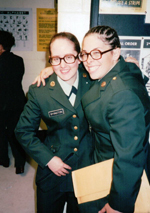 This may seem simple, but the achievement I am most proud of from my military career was making it through Basic Training. I was seventeen when I joined the Delayed Entry Program (DEP) and eighteen when I was set to enter active duty Army. That year gave me time to think about the choice I had made and eventually caused me to be afraid of moving forward with it. Nothing really had prepared me for that moment when I got off the bus at the Reception Center at Ft. Jackson, SC. However, I told myself that I made a commitment and needed to see it through, not just for our nation, but for myself. This may seem simple, but the achievement I am most proud of from my military career was making it through Basic Training. I was seventeen when I joined the Delayed Entry Program (DEP) and eighteen when I was set to enter active duty Army. That year gave me time to think about the choice I had made and eventually caused me to be afraid of moving forward with it. Nothing really had prepared me for that moment when I got off the bus at the Reception Center at Ft. Jackson, SC. However, I told myself that I made a commitment and needed to see it through, not just for our nation, but for myself.
I struggled through Basic Training (like many). The one thing that got me through was the camaraderie and the understanding that I would not give up, no matter how much it hurt or that I was scared. My unrelenting spirit and determination got the attention of my Drill Sergeant. At the end of our training, he tried to put me forward for promotion before any other high-achieving soldiers in our platoon. I think I also gained his respect, which I think is the most important aspect. He helped make my training experience challenging and fulfilling.
OF ALL THE MEDALS, AWARDS, QUALIFICATION BADGES OR DEVICES YOU RECEIVED, PLEASE DESCRIBE THE ONE(S) MOST MEANINGFUL TO YOU AND WHY?
The achievement I am most proud of, at this time, is my Combat Action Badge (CAB). I did not receive that badge until 2014, ten years after the event that got me it. On my last day in country, my unit and I took part in a firefight against insurgents while traveling on Hwy 1, just north of Baghdad. As 88Ms, we were exposed to the elements a lot more than others. We experienced IEDs, sniper fire, RPG attacks, and other things almost weekly. Many soldiers in my unit were never recognized for the actions we took to ensure mission success during those dangerous and trying times.
 Infantrymen have the Combat Infantry Badge to display their skills and experiences from combat. I am all too grateful that the rest of us now have something that signifies how we used our knowledge and skills to combat the enemy. Besides the CAB, I hope that I am finally able to receive the Army Commendation Medal I should have been awarded from my time in Kuwait and Iraq (2003-2004). I am working with my congressman to get this retroactive award. If I am successful in my pursuit, this will be another achievement I will be very proud of. For me, the medal will signify all the hard work and sacrifices I made while serving my country. Infantrymen have the Combat Infantry Badge to display their skills and experiences from combat. I am all too grateful that the rest of us now have something that signifies how we used our knowledge and skills to combat the enemy. Besides the CAB, I hope that I am finally able to receive the Army Commendation Medal I should have been awarded from my time in Kuwait and Iraq (2003-2004). I am working with my congressman to get this retroactive award. If I am successful in my pursuit, this will be another achievement I will be very proud of. For me, the medal will signify all the hard work and sacrifices I made while serving my country.
WHICH INDIVIDUAL(S) FROM YOUR TIME IN THE MILITARY STAND OUT AS HAVING THE MOST POSITIVE IMPACT ON YOU AND WHY?
Just a few soldiers from the platoons I served in made a positive impact on me. They were battle buddies to me while in the Army and are now close, dear friends. One of those soldiers made a lasting impact on me when she stood by my side during and after a traumatic event I went through in Iraq. She always made herself available to talk to; she ensured my safety and well-being when we traveled together. We both got out of the Army at the same time, helped each other get employment after the Army, and supported each other in our educational pursuits. after a traumatic event I went through in Iraq. She always made herself available to talk to; she ensured my safety and well-being when we traveled together. We both got out of the Army at the same time, helped each other get employment after the Army, and supported each other in our educational pursuits.
Another soldier that had a tremendous impact on me was my last squad leader because he took the time to mold me into an even better soldier. This, unfortunately, came just before I got out of the Army, however he helped me in all of my professional endeavors. He helped me to nearly max-out on my last APFT in 2004, and put me positions of leadership even though I was the lowest ranking soldier in my squad. He believed in me and showed others in our unit just how much my service meant--specifically when he put me forward for an Army Commendation Medal.
CAN YOU RECOUNT A PARTICULAR INCIDENT FROM YOUR SERVICE WHICH MAY OR MAY NOT HAVE BEEN FUNNY AT THE TIME, BUT STILL MAKES YOU LAUGH?
The poor choices I made during my time at 88M AIT make me laugh when I think and talk about those experiences now. I was accused of being a ring leader of a group of soldiers that wanted to have Church's Chicken at the PX. We were getting ready to graduate and move on to our next duty stations; this called for us to walk all over Ft. Leonard Wood to out-process. In the midst of our out-processing, we grew hungry and some suggested we stop for some chicken. Apparently, all the Drill Sergeants from our school wanted some chicken, too. Not thinking, we got our food and sat down near the counter. They eventually came in and didn't seem to notice us, however we noticed them. Needless to say, one of them eventually recognized us. graduate and move on to our next duty stations; this called for us to walk all over Ft. Leonard Wood to out-process. In the midst of our out-processing, we grew hungry and some suggested we stop for some chicken. Apparently, all the Drill Sergeants from our school wanted some chicken, too. Not thinking, we got our food and sat down near the counter. They eventually came in and didn't seem to notice us, however we noticed them. Needless to say, one of them eventually recognized us.
Our platoon Drill Sergeant promptly took us all outside and commenced the butt-chewing. As she got to me, she stated that she thought I was probably the ring leader that made the suggestion. She focused on me quite a bit during my training because I was always quiet, which she didn't like. According to her, the "quiet ones" were the ones to look out for (and apparently were the most troublesome). Later on, it came out that I did not orchestrate the visit to Church's Chicken and we were not punished for going there (the Drill Sergeants actually thought it was funny). Our little group was then nicknamed the "Church's Chicken Bandits."
WHAT PROFESSION DID YOU FOLLOW AFTER YOUR MILITARY SERVICE AND WHAT ARE YOU DOING NOW? IF YOU ARE CURRENTLY SERVING, WHAT IS YOUR PRESENT OCCUPATIONAL SPECIALTY?
When I left the Army in 2004, I knew I wanted to go back to Iraq as a civilian contractor. I came home and applied for special funding through the Workforce Investment Act (WIA) to attend truck driver school. Once I got the funding, I took the local school's advanced driver course, based on my military driving experience, and graduated in about a month with my Class A CDL. Then, I contacted a recruiter at KBR and was able to go back to Iraq to drive trucks. I supported the US State Department at various embassy locations in Iraq and Kuwait. I was promoted to an office support/supervisor position after two years. driver course, based on my military driving experience, and graduated in about a month with my Class A CDL. Then, I contacted a recruiter at KBR and was able to go back to Iraq to drive trucks. I supported the US State Department at various embassy locations in Iraq and Kuwait. I was promoted to an office support/supervisor position after two years.
There were a great deal of politics involved with that company and the work we performed. My experience with them showed me that if I wanted to get somewhere in the civilian world, I needed to have an education. So, after three years with KBR, I came home and began working for a quasi-governmental agency (state level), while pursuing my undergraduate studies. I received my B.A. in Political Science and International Studies in 2012 and my M.P.S. in Security and Safety Leadership in 2014. It is my intent to start a career in security (administration), considering that I am very knowledgeable and passionate about the work that is performed in that field.
I am considering a return to school to obtain my either my Doctorate in Political Science, with an emphasis on Terrorism Studies. Or, I may very well pursue certifications in Cyber Security. For the meantime, I work with AmeriCorps as a Veterans' Liaison at the Idaho Department of Labor. I provide special employment services to area veterans and educate them on what VA benefits and community resources are available to them.
WHAT MILITARY ASSOCIATIONS ARE YOU A MEMBER OF, IF ANY? WHAT SPECIFIC BENEFITS DO YOU DERIVE FROM YOUR MEMBERSHIPS?
When I got out in 2004, I joined the local American Legion, Post 23. When I was awarded a service-connected disability rating, I joined the Wounded Warrior Project (2012). I also joined the Iraq Afghanistan Veterans of America (IAVA) organization to stay abreast of all legislation that was being considered and passed for veterans. The benefits I derive from being part of those organizations is of course, camaraderie, as well as information regarding VA benefits and services that are available to me. and passed for veterans. The benefits I derive from being part of those organizations is of course, camaraderie, as well as information regarding VA benefits and services that are available to me.
When I began my undergraduate studies at Idaho State University (ISU) in 2008, I saw the need for a veterans club on campus. So in 2009, I started and led the campus's first Armed Forces Veterans' Club. It gained a strong following in the three years I was attending ISU, and was instrumental in bringing veterans issues to the forefront. During my club presidency term, I helped shape the first veterans' transitional program at the school: ISU Veterans' Sanctuary. To this day, the program helps all service members and veterans access the tools and information they need in order to enter and finish school successfully, then move on to a fulfilling career.
IN WHAT WAYS HAS SERVING IN THE MILITARY INFLUENCED THE WAY YOU HAVE APPROACHED YOUR LIFE AND YOUR CAREER?
 My time in the Army has helped shape me into a dedicated and compassionate person who wants to continually serve our nation in one capacity or another. My experience has provided me the knowledge and motivation I need to achieve my goals in life. It has shown me what I am capable of. We were always reminded by the leadership in our unit that the things we do in the Army are "90% mental and 10% physical," obviously meaning that if you set your mind to something, it can be done. I have applied that concept in everything I do and it has served me well. I have overcome a lot of obstacles by staying mentally focused, strong and determined. My time in the Army has helped shape me into a dedicated and compassionate person who wants to continually serve our nation in one capacity or another. My experience has provided me the knowledge and motivation I need to achieve my goals in life. It has shown me what I am capable of. We were always reminded by the leadership in our unit that the things we do in the Army are "90% mental and 10% physical," obviously meaning that if you set your mind to something, it can be done. I have applied that concept in everything I do and it has served me well. I have overcome a lot of obstacles by staying mentally focused, strong and determined.
BASED ON YOUR OWN EXPERIENCES, WHAT ADVICE WOULD YOU GIVE TO THOSE WHO HAVE RECENTLY JOINED THE ARMY?
The Army is what you make of it; don't go in for the wrong reasons. Don't become complacent or shirk your duties because others are counting on you. Live by the Army Values as best as you can. When it comes time for promotion, remember that you'll be saddled with more responsibilities. To be a true leader of soldiers, you must be willing to set an example. Always be involved in the work at hand and help those that are struggling the most. Inspire others to take on challenges and achieve all they can. more responsibilities. To be a true leader of soldiers, you must be willing to set an example. Always be involved in the work at hand and help those that are struggling the most. Inspire others to take on challenges and achieve all they can.
When the slogan was "Be all you can be in the Army," they weren't lying! As a soldier, you'll have to do things you don't like, but just keep in mind there is a reason they need to be done. Also, remember that you're not in it alone. The military is not for everyone, but if you decide to stay in it for the long haul, have fun, serve with honor and always do the right thing. If you decide the Army is not for you, finish your obligation honorably, get out and take your acquired skills somewhere else.
IN WHAT WAYS HAS TOGETHERWESERVED.COM HELPED YOU REMEMBER YOUR MILITARY SERVICE AND THE FRIENDS YOU SERVED WITH.
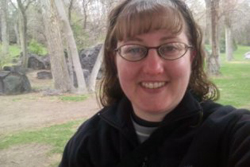 My military service is never far from my mind. I am just glad to be on here to connect with people that have similar experiences and backgrounds as I do. I like to show-off what I achieved while I was in the Army. I like to also look at others' profiles and see what they achieved--I have tremendous respect for so many on here. I encourage all my fellow veterans to join "Together We Served" in order to reestablish camaraderie and enjoy being part of something special all over again. My military service is never far from my mind. I am just glad to be on here to connect with people that have similar experiences and backgrounds as I do. I like to show-off what I achieved while I was in the Army. I like to also look at others' profiles and see what they achieved--I have tremendous respect for so many on here. I encourage all my fellow veterans to join "Together We Served" in order to reestablish camaraderie and enjoy being part of something special all over again.
|
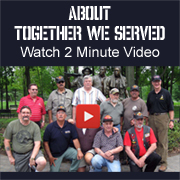

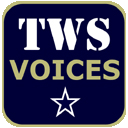
Read Other Interviews in the TWS Voices Archive | Share this Voices Edition on:


  |
|
TWS VOICES
Voices are the personal stories of men and women who served in the US Military and convey how serving their Country has made a positive impact on their lives. If you would like to participate in a future edition of Voices, or know someone who might be interested, please contact TWS Voices HERE.
This edition of Army Voices was supported by:
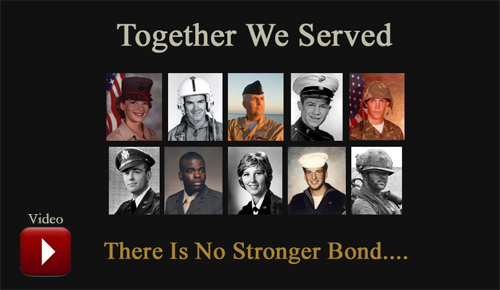
Army.Togetherweserved.com
For current and former serving Members of the US Army, US Army Reserve and US Army National Guard, TogetherWeServed.com is a unique, feature rich resource helping Soldiers re-connect with lost Brothers, share memories and tell their Army story.
To join Army.Togetherweserved.com, please click HERE.
| |